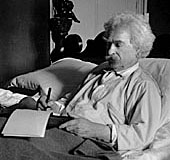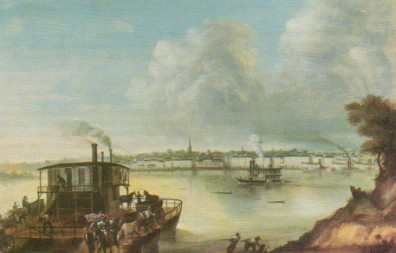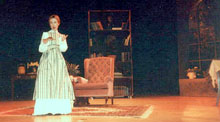|
● Early
Fiction
● Transcendentalists
● Power
of Imagination
● New
Visions of America
● Reform
and Liberation
● Regionalism
● A
New Wave
● Sympathetic
Views
● Rebellious Spirit
● The
Modernists
● The Lost Generation
● Harlem Renaissance
● New
Drama
● Depression,
Realism and Escapism
● Postwar Voices
and the "Beat Generation"
● New American
Voices
Regionalism
 |
|
Mark Twain
|
 In
many ways, this bloody divisive war dimmed American optimism, and
for a time writers retreated from national themes. The country
had been growing; as pioneers settled new territories in the West,
writers now focused on the differences between the various regions
of the United States rather than on a single vision of the expanding
country. One of the most important leaders of this "regionalism"
movement was William Dean Howells (1837-1920), who in 1866 became
editor of the influential Atlantic magazine. Howells published stories
from all over the United States, and in his literary reviews he
praised writers who described local life realistically. The raw
mining camps and settlements of the far West were brought to life
by storytellers such as Bret Harte, in The Luck of Roaring Camp,
and a newspaper correspondent named Samuel Clemens (1835-1910),
who wrote under the pen name of Mark
Twain. In
many ways, this bloody divisive war dimmed American optimism, and
for a time writers retreated from national themes. The country
had been growing; as pioneers settled new territories in the West,
writers now focused on the differences between the various regions
of the United States rather than on a single vision of the expanding
country. One of the most important leaders of this "regionalism"
movement was William Dean Howells (1837-1920), who in 1866 became
editor of the influential Atlantic magazine. Howells published stories
from all over the United States, and in his literary reviews he
praised writers who described local life realistically. The raw
mining camps and settlements of the far West were brought to life
by storytellers such as Bret Harte, in The Luck of Roaring Camp,
and a newspaper correspondent named Samuel Clemens (1835-1910),
who wrote under the pen name of Mark
Twain.
 |
|
The Mississippi
River
|
 Mark
Twain was the first major American writer to be born away from the
East Coast. He grew up in a small town on the banks of the Mississippi
River and received only a basic public school education. He began
working in a printer's shop when he was still a boy, and this experience
led to a series of newspaper jobs in the Midwest and the West. Twain
was a new voice, an original genius,
a man of the people, and he quickly won readers. He captured a peculiarly
American sense of humor, telling outrageous
jokes and tall
tales in a calm, innocent, matter-of-fact manner. He
sometimes used local dialect for comic effect, but even his normal
prose style sounded distinctively American—rich in metaphor,
newly invented words and drawling rhythms. Mark
Twain was the first major American writer to be born away from the
East Coast. He grew up in a small town on the banks of the Mississippi
River and received only a basic public school education. He began
working in a printer's shop when he was still a boy, and this experience
led to a series of newspaper jobs in the Midwest and the West. Twain
was a new voice, an original genius,
a man of the people, and he quickly won readers. He captured a peculiarly
American sense of humor, telling outrageous
jokes and tall
tales in a calm, innocent, matter-of-fact manner. He
sometimes used local dialect for comic effect, but even his normal
prose style sounded distinctively American—rich in metaphor,
newly invented words and drawling rhythms.
 Twain
had a cynical streak that matched the country's skeptical post-Civil
War mood. He soon developed beyond merely "regional"
stories and turned to comic novels. His shrewd
social satire
was most apparent in books such as A Connecticut Yankee in King
Arthur's Court, but perhaps his greatest book is The Adventures
of Huckleberry Finn (1884). This is the story of a boy running
away from home and steering
a raft
down the Mississippi River, but it is more than that. The people
the boy meets cover the entire spectrum of humanity, and his voyage
down the river becomes a metaphor for a journey through life. Funny,
powerful, humane
and laced
with social commentary and criticism, Huckleberry
Finn has been called the greatest novel in American literature. Twain
had a cynical streak that matched the country's skeptical post-Civil
War mood. He soon developed beyond merely "regional"
stories and turned to comic novels. His shrewd
social satire
was most apparent in books such as A Connecticut Yankee in King
Arthur's Court, but perhaps his greatest book is The Adventures
of Huckleberry Finn (1884). This is the story of a boy running
away from home and steering
a raft
down the Mississippi River, but it is more than that. The people
the boy meets cover the entire spectrum of humanity, and his voyage
down the river becomes a metaphor for a journey through life. Funny,
powerful, humane
and laced
with social commentary and criticism, Huckleberry
Finn has been called the greatest novel in American literature.
 While
prose fiction in the United States was developing in vital
imaginative ways, poetry seemed to recede
as an art form. The poetic giant Whitman died in the 1880s, as
did a poet who has been admired by later generations, but who was
barely known while she lived. This unrecognized poet
was Emily Dickinson (1830-1886).Her poetry mixed gaiety
and gloom.
During the last 25 years of her life, she rarely left the grounds
of the Dickinson household in Amherst, Massachusetts. But her imagination
took her on long flights
of fancy.
Her verses
are filled with the names of faraway, While
prose fiction in the United States was developing in vital
imaginative ways, poetry seemed to recede
as an art form. The poetic giant Whitman died in the 1880s, as
did a poet who has been admired by later generations, but who was
barely known while she lived. This unrecognized poet
was Emily Dickinson (1830-1886).Her poetry mixed gaiety
and gloom.
During the last 25 years of her life, she rarely left the grounds
of the Dickinson household in Amherst, Massachusetts. But her imagination
took her on long flights
of fancy.
Her verses
are filled with the names of faraway,
 |
|
A Play about Emily
Dickinson
|
exotic places that she visited only
in imagination. On the other hand, she could make poetic drama out
of things close at hand--a cracked plate on a shelf in the dining
room or the sound of a honeybee
in the garden. She was fascinated by life. She
was also more than a little in love with death. Of the
1500 poems she composed, more than 600 have to do with dying. Almost
all of her poems are brief, rarely more than 12 or 15 lines long.
But
in small spaces she packed an emotional charge of surprising force.
Previous Page Next
Page
|

